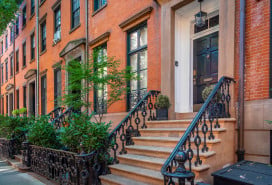A slacker’s guide to the September issue of Habitat

Tropical depressions and August ennui couldn't keep us from digging into the new issue of Habitat magazine, which arrived in our mailbox this weekend. For those of you who don’t subscribe or haven’t had a chance to read it, we've summarized the juiciest bits below.
(Note: Most of the issue isn't online yet--and will be tucked behind a pay-to-view curtain--so we’ve included old-fashioned page numbers too.)
1. A 1,200-unit co-op in Clinton Hill, Brooklyn, is saving $162,719 a year with the help of a free city-sponsored "water audit" that finds leaks. One leaky toilet was wasting 401,000 gallons annually ($2,100 a year). A defective faucet in another apartment was costing the co-op $3,650 a month. This is one audit we are looking forward to. (p. 6)
2. Four years after it sold out, a Tribeca condo conversion at 49 Warren Street still doesn’t have its permanent certificate of occupancy. The unhappy loft owners have been working with the Attorney General's office to get the sponsor, Lawrence Omansky, to fix a variety of problems with the roof, elevator, intercom system and windows.
So far, so normal--until Omansky sounds off like a cranky parent as he essentially tells the residents to grow up already: “’You bought the building, you took the building as is. What do you expect out of my life? Just because I’m the sponsor I have to keep coming and fixing up your building? When do you take responsibility for your own building?’”
The tough-love response from the condo’s manager: “Omansky is responsible for everything until he obtains the permanent certificate of occupancy.” (p. 32)
3. Appropriating a marketing tactic more commonly used by developers, a 194-unit co-op at 200 East 16th Street eschewed the annual board meeting and the inhouse newsletter as pulpits for a six-figure lobby renovation.
Instead, the board distributed “a slickly produced package” that argued for going ahead with the project during the Great Recession (the original $350,000 price tag had been knocked down by $120,000) and included a floor plan, 3-D renderings, a budget breakdown and a detailed construction schedule. The rather astonishing result: Not a single objection. (p.10)
4. When it comes to making co-ops and condos handicap-accessible, the “’Bloomberg administration has gotten religion. They’re obsessive about enforcing the rules,’” says a lawyer in a story about budget-friendly ways to comply with the accessibility laws. Exhibit A: Rather than moving stairs and installing a 31-foot ramp in a project that would have cost $250,000-300,000, a 445-unit condo building in the West 40s installed a chair lift for just $35,000. (p. 20)
5. A Gramercy Park co-op is minting money in the basement: It spent $32,000 installing 33 storage bins, then rented them out to residents at 90 cents per cubic foot (that’s $115/month for a four-by-four-by-eight foot bin). Now the 83-unit co-op is earning $48,000 a year for its efforts. Nice. (p. 29)

























